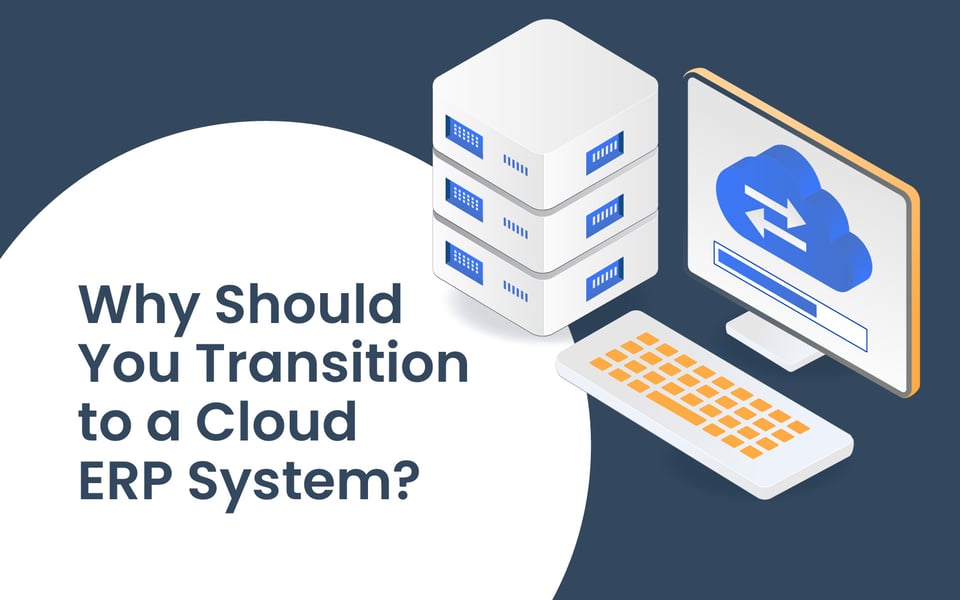What is an ERP system?
An enterprise resource planning (ERP) system is a comprehensive software solution for day-to-day operations. A well-integrated suite streamlines processes and provides support throughout a company, including accounting, compliance, supply chain operations, risk management and assessment, manufacturing, and more.
Exchanging inefficient manual processes for innovative digital options will reduce redundancies and minimize the human errors related to manual inputs. Plus, with data stored in a secure, centralized location, you can access and analyze large amounts of data in real time, leading to more efficient decision-making.
Based on business needs, an ERP can be in-house, remote, or hybrid. Choosing the model that fits your budget and existing policies can improve the bottom line and lead to easier scaling in the future.
What is ERP cloud migration?
When a company moves its databases, digital assets, and other services to the cloud, the process is referred to as cloud migration. This term can also be applied to the act of transitioning from one cloud system to another.
Types of ERP Migrations
Depending on the organization’s end goals, there are different types of migrations to consider.
- Rehost: This is when assets are moved from an on-premise host to a cloud service and typically begins with the simplest infrastructure first to minimize downtimes and gaps in processes.
- Replatform: This option is best suited for companies looking to consolidate the total number of applications being used and helps reduce overall operational costs.
- Refactor: If you’re looking to update components so they meet new enterprise standards, refactoring is likely your best choice.
What are the problems with manual reporting processes?
So, what’s the big deal? Why are so many businesses choosing to gravitate toward cloud ERP systems and away from traditional processes? It turns out that manual methods have disadvantages that can harm company operations and end up costing the organization significant amounts of money.
Manual inputs are prone to error, unlike their digital counterparts. These mistakes cause inaccuracies and inefficient reporting that creates a false narrative for decision makers analyzing the data. This, in turn, translates to missing out on crucial insights and information that may give competitors an edge in the industry.
At the end of the day, it comes down to this: Manual reporting processes waste swathes of time, money, and resources that would be more efficient if allocated elsewhere. Luckily, developers have realized the importance and need for better tools to support businesses around the world.
How can a cloud ERP system support growth and innovation?
Migrating to a cloud ERP system is one solution that brings a plethora of advantages to the business table. These digital capabilities bring significant changes to business outcomes and performance. Making the switch can improve revenue, cost efficiencies, customer satisfaction, operational efficiency, staff productivity, and overall innovation by as much as 75-95 percent.
By choosing an ERP that integrates with the third-party applications that already exist in the company, different departments and levels of an organization can share unparalleled cohesion that promotes healthier business practices.
Along the same lines, analysts and decision makers will be able to make forecasts with confidence because they know the information collected is accurate and up to date.
A trusted ERP partner will also be able to bolster security and protect data from getting into the wrong hands. Automate security functions to get peace of mind and keep cyberthreats away from personal information and proprietary assets.
It’s also just plain easier to grow the bottom line and scale the business when working with real-time information and accurate historical data.
Transform your business with a cloud ERP system.
Strategic growth should be available to all businesses, and implementing a cloud ERP system is a simple, cost-effective way to accomplish those goals. If you’re still relying on slow, inaccurate datasets to steer business decisions, you’re creating a deficit that you could easily avoid.
Whether your current business goals are to grow your wealth, build a strong team, manage debt, or more, Ignite Spot’s outsourced CFO services can assist in propelling your business to success and help identify the right cloud ERP system for you.












.png)




.png?width=160&height=160&name=Gold%20(1).png)
